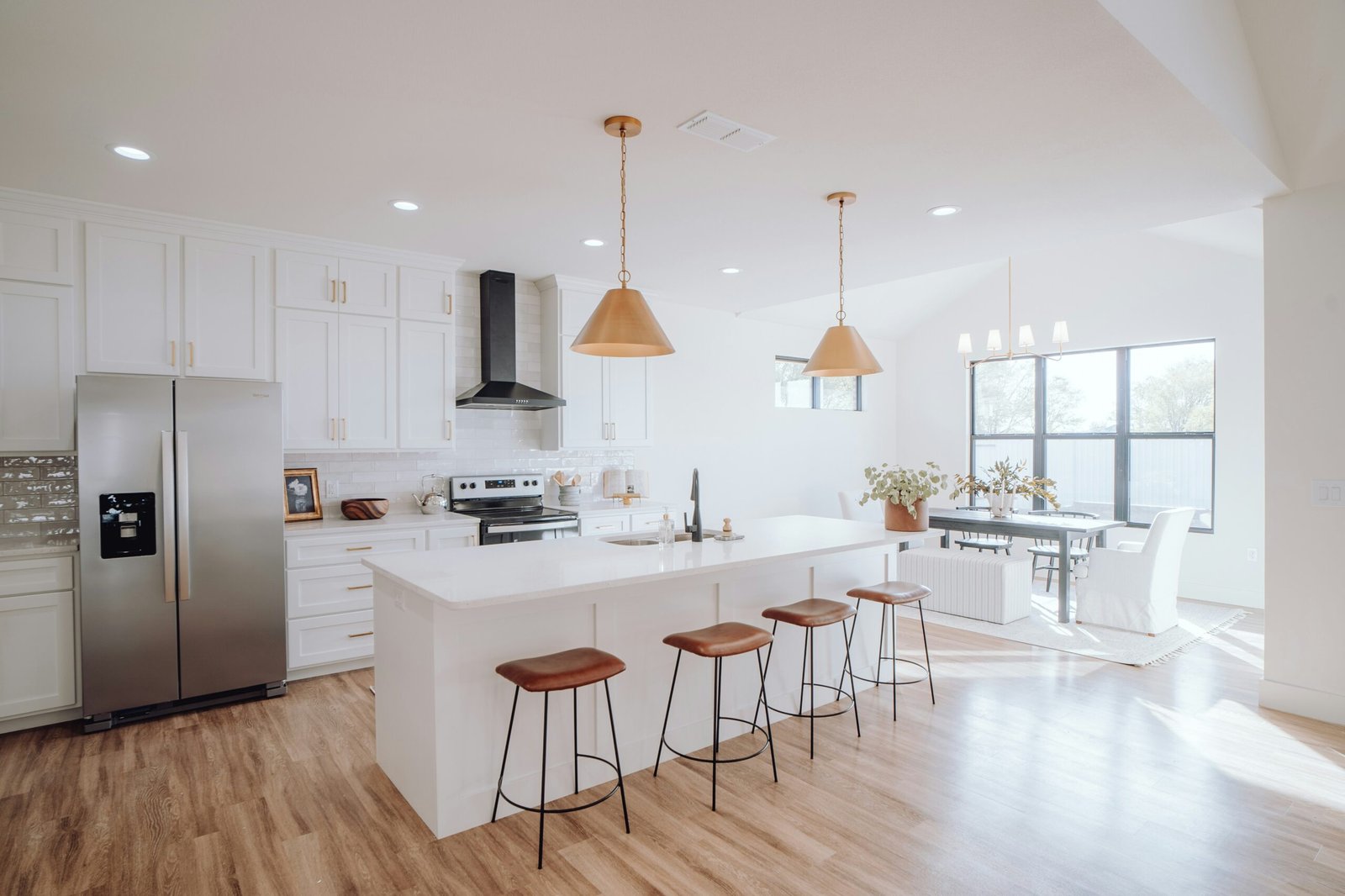
When embarking on a kitchen remodeling project, selecting the right material for your kitchen island is a crucial decision. Your kitchen island is more than just a functional piece; it serves as a focal point and a gathering spot for family and friends. At iHomes Remodeling in Houston, TX, we understand the importance of choosing the best kitchen countertop material to fit your lifestyle and aesthetic preferences. Let’s delve into the popular choices, their pros and cons, and help you make an informed decision.
Quartz Countertops: A Top Choice for Durability and Style
Quartz countertops are a popular choice among homeowners and kitchen designers alike. This engineered stone combines natural quartz with resins and pigments to create a durable, non-porous surface. One of the standout features of a quartz countertop is its stain-resistant and heat-resistant properties, making it an ideal material for your kitchen island, especially in high-traffic areas.
Pros:
Stain Resistant: Quartz is non-porous, which means it resists staining from spills and splashes.
Easy to Clean: Its smooth surface makes cleaning a breeze, requiring just mild soap and water.
Durability: Quartz is incredibly hard and resistant to scratches, making it perfect for a busy kitchen.
Cons:
Heat Sensitivity: Although heat resistant, it’s recommended to use trivets or hot pads to prevent any potential damage from extreme heat.
Cost: Quartz countertops can be more expensive than other materials, but their longevity and low maintenance often justify the price.
Granite: The Natural Beauty of Stone
Granite countertops are renowned for their natural beauty and unique patterns, adding a touch of elegance to any kitchen island. As a natural stone countertop, granite offers a robust and heat-resistant surface, making it a great choice for those who appreciate a blend of aesthetics and functionality.
Pros:
Natural Beauty: Each slab of granite is unique, offering one-of-a-kind patterns and colors.
Heat Resistant: Granite can withstand high temperatures, perfect for placing hot pots and pans directly on the surface.
Durability: With proper sealing, granite is resistant to scratches and stains.
Cons:
Maintenance: Granite requires regular sealing to maintain its stain-resistant properties.
Cost: Similar to quartz, granite can be pricey, but its durability and timeless appeal often make it a worthy investment.
Marble Countertops: A Luxurious Choice with Classic Appeal
Marble countertops exude luxury and sophistication, making them a coveted material for kitchen islands. Known for its elegant veining and smooth texture, marble is a timeless choice that adds a classic charm to any kitchen.
Pros:
Aesthetic Appeal: Marble’s distinctive veining and natural beauty make it a standout choice.
Heat Resistant: Ideal for baking enthusiasts, marble remains cool and is perfect for rolling out dough.
Cons:
Porosity: Marble is more porous than granite and quartz, making it susceptible to stains and scratches.
Maintenance: It requires regular sealing and careful maintenance to preserve its beauty.
Butcher Block: Warmth and Functionality
For those who love the warmth and natural feel of wood, butcher block countertops are a fantastic option. These countertops are made from thick strips of wood glued together, providing a sturdy and functional surface for your kitchen island.
Pros:
Natural Warmth: Butcher block adds a cozy and inviting feel to the kitchen.
Versatile: It’s ideal for food preparation and can be sanded down to remove scratches and dents.
Affordable: Generally more affordable than stone countertops.
Cons:
Maintenance: Butcher block requires regular oiling to prevent drying and cracking.
Susceptible to Damage: It can be prone to scratches, stains, and water damage if not properly maintained.
Stainless Steel: A Modern and Professional Touch
Stainless steel countertops bring a sleek, modern, and professional look to any kitchen. Favored in commercial kitchens for their durability and ease of maintenance, stainless steel is becoming increasingly popular in residential kitchens as well.
Pros:
Durability: Stainless steel is resistant to heat, stains, and corrosion.
Easy to Clean: Its non-porous surface makes cleaning simple and effective.
Modern Aesthetic: It adds a contemporary and industrial feel to the kitchen.
Cons:
Scratch Prone: Stainless steel can show scratches and fingerprints.
Cost: It can be expensive, but its long-lasting nature can offset the initial investment.
Making the Best Choice for Your Kitchen Island
Selecting the best material for your kitchen island depends on your lifestyle, budget, and aesthetic preferences. At iHomes Remodeling, we recommend considering the following factors:
Durability: For high-traffic kitchens, materials like quartz and granite are excellent choices due to their resilience and low maintenance.
Aesthetic Appeal: Marble and granite offer unique natural beauty, while stainless steel provides a sleek, modern look.
Maintenance: Choose a material that fits your willingness to maintain it. Quartz and stainless steel are easy to care for, whereas marble and butcher block require more attention.
Budget: Balancing cost with long-term value is crucial. While some materials may have a higher upfront cost, their durability and low maintenance can offer better value over time.
The best material for your kitchen island is one that meets your specific needs and complements your kitchen’s design. Whether you prefer the natural beauty of granite, the durability of quartz, or the warmth of butcher block, there is a perfect kitchen counter material for your kitchen remodeling project. At iHomes Remodeling in Houston, TX, we are here to guide you through the selection process and ensure your kitchen island becomes a stunning centerpiece in your home.
